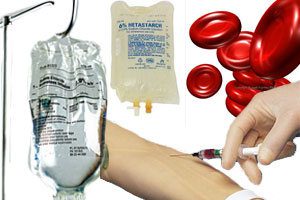
Hydroxyethyl Starch Solutions May Cause Kidney Failure. Hydroxyethyl starch (HES) solutions are used to treat hypovolemia (low blood volume) that may result from trauma, sepsis, burns, or anaphylaxis. The solutions are administered intravenously to patients in order to maintain or expand plasma volume. HES products are used prior to hospitalization, as well as during […]

Hydroxyethyl Starch Solutions May Cause Kidney Failure. Hydroxyethyl starch (HES) solutions are used to treat hypovolemia (low blood volume) that may result from trauma, sepsis, burns, or anaphylaxis. The solutions are administered intravenously to patients in order to maintain or expand plasma volume. HES products are used prior to hospitalization, as well as during it, in both military and civilian settings. Recent data has linked the use of these products with an increased risk of severe adverse events for some patient populations.
According to the U.S. Food and Drug Administration (FDA), HES solutions can cause an increased risk of mortality and renal injury among critically ill adult patients, including those with sepsis (a serious complication that can develop from infection) and those admitted to the intensive care unit; they can also cause patients undergoing open heart surgery in conjunction with a cardiopulmonary bypass to bleed extensively. The regulator said additional caution is needed regarding the use of these products.
Health Canada along with the manufacturers of the blood volume expanders containing (HES) reiterated the risks in a June 24, 2012 communication. Stating, specifically, HES solutions should not be used:
Some recent studies have compared HES with other blood volume expanders in critically ill patients with sepsis. These studies suggest that patients treated with HES are at a higher risk of kidney failure or death.
In September 2012, the FDA discussed the risks and benefits of HES solutions at a public workshop; also in attendance were the National Heart, Lung, and Blood Institute of the National Institutes of Health; the U.S. Army Materiel Command, Department of Defense; and the Office of the Assistant Secretary of Health, Health and Human Services.
Panelists from the various agencies and departments presented data from randomized controlled trials and other types of studies that indicated HES brought an increased risk of mortality and/or renal injury requiring renal replacement therapy (RRT) when it was used on critically ill adult patients.
The FDA, therefore, concluded that HES solutions should not be used on patients in these populations – and that a boxed warning showcasing these risks was called for. In addition, the FDA reviewed an analysis of studies conducted on patients undergoing open heart surgery combined with cardiopulmonary bypass, and determined an additional warning of excessive bleeding was needed in the package insert.
Patients should be aware of the risks associated with the use of HES solutions and discuss them with their healthcare provider. Further, they should:
Symptoms of kidney damage, such as what can be caused by the use of HES solutions, include:
The personal injury attorneys at Parker Waichman LLP offer free, no-obligation case evaluations. For more information, fill out our online contact form or call 1-800-YOURLAWYER (1-800-968-7529).


